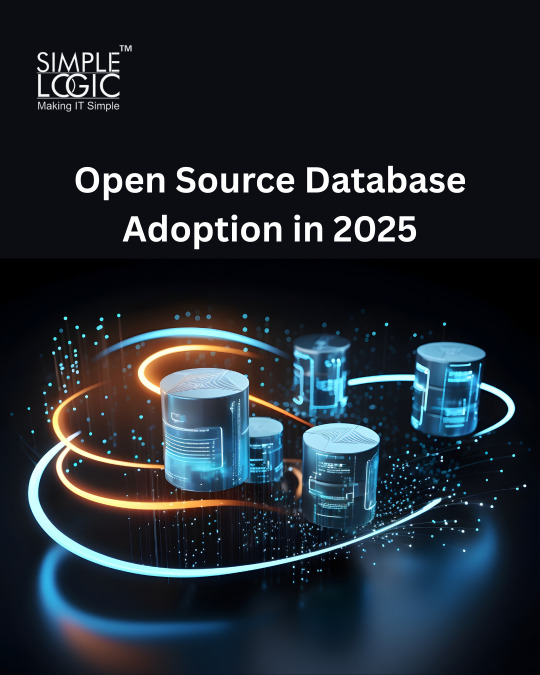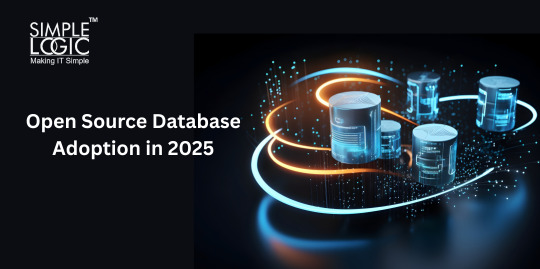#DatabaseAdoption2025
Explore tagged Tumblr posts
Text

Open Source Database Adoption in 2025: Are You Ready? 🐘💡 Open source databases are no longer just an alternative they’re becoming the preferred choice for enterprises in 2025. From flexibility to cost efficiency and community backed innovation, the shift is happening fast! 🚀
👉 Check out the full blog📖 https://simplelogic-it.com/open-source-database-adoption-in-2025/
📚 Learn more about Open Source Database Management 👉 https://simplelogic-it.com/open-source-database-management/
📞 Get in touch with our experts 👉 https://simplelogic-it.com/contact-us/
📌 Explore more insights: https://simplelogic-it.com/
#OpenSourceDatabase#DatabaseAdoption2025#PostgreSQL#MySQL#DatabaseInnovation#TechTrends2025#EnterpriseIT#DatabaseManagement#MakeITSimple#SimpleLogicIT#SimpleLogic#MakingITSimple#ITServices#ITConsulting#testyourknowledge
0 notes
Text
Why Open Source Database Adoption is Accelerating in 2025

In 2025, open source databases have officially moved from niche solutions to mainstream enterprise choices. With the ever-growing need for scalable, cost-efficient, and flexible data management systems, organizations are increasingly turning toward open source database management solutions to drive innovation and reduce vendor lock-in. From MySQL to PostgreSQL and MongoDB, the popularity of these platforms has surged across industries.
But why are so many businesses making the switch now? Let’s explore the growing adoption of open source databases, their features, benefits, and how to implement them in your IT ecosystem.
Key Features of Open Source Databases
✔️ Source Code Access – Modify and optimize your database to suit your business logic. ✔️ Community-Driven Development – Get regular updates, security patches, and support from global communities. ✔️ Cross-Platform Compatibility – Open source databases are platform-independent and highly portable. ✔️ Support for Advanced Data Models – Handle structured, semi-structured, and unstructured data easily. ✔️ Integrations and Extensions – Access a variety of plug-ins and connectors to expand functionality.
Why Open Source Database Adoption is Booming in 2025
💡 1. Cost-Effectiveness
No hefty licensing fees. Businesses save significantly on software costs while still getting robust features.
⚡ 2. Flexibility and Customization
Developers can fine-tune the database, adjust configurations, or build new functionalities—something proprietary systems limit.
🔒 3. Strong Security and Transparency
With open source, vulnerabilities are exposed and fixed faster thanks to large developer communities.
🚀 4. Scalable for Modern Applications
Whether it's IoT, big data, or AI-driven apps, open source databases scale well horizontally and vertically.
🌐 5. No Vendor Lock-In
Businesses can avoid being stuck with a single provider and switch or scale as needed.
Steps to Successfully Adopt an Open Source Database
✅ Step 1: Evaluate Your Current Infrastructure
Understand your existing data structure, workloads, and performance needs.
✅ Step 2: Choose the Right Database (MySQL, PostgreSQL, MongoDB, etc.)
Pick a database based on your data type, scale, transaction needs, and technical stack.
✅ Step 3: Plan Migration Carefully
Work with experts to move from proprietary systems to open source databases without data loss or downtime.
✅ Step 4: Monitor & Optimize Post-Migration
Use tools for performance monitoring, indexing, and query optimization to get the best out of your new setup.
Real-World Use Cases of Open Source Databases
🏥 Healthcare: Managing patient data securely and affordably. 🛍️ E-commerce: Handling high transaction volumes with scalable databases. 💼 Enterprises: Leveraging PostgreSQL and MySQL for internal applications. 📱 Mobile Apps: Using MongoDB for flexible and fast mobile backend support.
FAQs on Open Source Database Adoption
❓ Are open source databases secure for enterprise use?
Yes, most modern open source databases are highly secure with active communities and regular updates.
❓ What are some top open source databases in 2025?
PostgreSQL, MySQL, MariaDB, MongoDB, and Apache Cassandra are leading the pack.
❓ Will I need in-house expertise to manage it?
Not necessarily. You can always work with managed service providers like Simple Logic to handle everything from setup to optimization.
❓ Can open source databases support enterprise-scale apps?
Absolutely! They support clustering, replication, high availability, and advanced performance tuning.
❓ How can I migrate from my current database to an open source one?
With expert planning, data assessment, and the right tools. Reach out to Simple Logic for a guided and smooth transition.
Conclusion: Future-Proof Your Business with Open Source Databases
Open source databases are no longer a tech experiment—they're the backbone of modern digital infrastructure. From scalability to security, businesses in 2025 are realizing the value of making the shift. If you're still relying on outdated, expensive proprietary databases, it’s time to explore smarter, more agile options.
✅ Ready to Embrace Open Source? Let’s Talk!
Whether you’re planning to adopt PostgreSQL, MySQL, or any other open source database, Simple Logic offers expert guidance, migration support, and performance tuning to ensure a seamless experience.
📞 Call us today at +91 86556 1654 🌐 Visit: www.simplelogic-it.com
👉 Don’t just follow the trend lead with innovation! 🚀
https://simplelogic-it.com/open-source-database-adoption-in-2025/
#OpenSourceDatabase#DatabaseAdoption2025#PostgreSQL#MySQL#DatabaseInnovation#TechTrends2025#EnterpriseIT#DatabaseManagement#MakeITSimple#SimpleLogicIT#SimpleLogic#MakingITSimple#ITServices#ITConsulting
0 notes